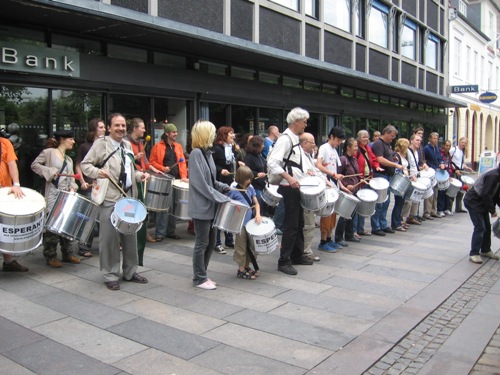| Posted: April 12 2010,15:59 |
If you wrote this report, you will find a button here that you may click
in order to make changes in the report. 
|
Postal address of organization/institution
|
777 United Nations Plaza
New York, New York 10017
|
E-mail address of organization/institution
|
neil_nachum@yahoo.com
|
Website address of organization/institution
|
www.uea.org
|
Telephone of organization/institution
|
|
PRIORITIES: All of the organization's domains of culture of peace activity |
EDUCATION FOR PEACE
HUMAN RIGHTS
UNDERSTANDING, TOLERANCE AND SOLIDARITY
|
TOP PRIORITY: The organization's most important culture of peace activity |
EDUCATION FOR PEACE
|
PARTNERSHIPS AND NETWORKS: What
partnerships and networks does your organization participate in, thus
strengthening the global movement for a culture of peace? |
missing data
|
ACTIONS: What activities have
been undertaken by your organization to promote a culture of peace and
nonviolence during the ten years of the Decade? If you already made a
report in 2005, your information from 2005 will be included in the 2010
report.
|

Universal
Esperanto Association has been the most representitive organization of
the Esperanto-speaking community, which may number over a
million speakers, dispersed throughout the world. UEA publishes a
monthly magazine since it's inception (1905) and several books a year.
It organizes a general conference (Universala Kongreso or UK)
annually. It has occurred in nearly every European country since 1905.
We attempt to alternate continents (Europe, Asia and the Americas) as
our movement spreads in the past twenty years. Another
sister-organization, The International Asssociation of Esperanto
Teachers also has an annual conference, which recently took place in
Western Africa. Our centennial convention celebrating 100 years
of Esperanto included over 5,000 participants. We are averaging 2,000
participants from 70 countries in the past decade. We are a
diverse group. About a dozen religions have separate and joint
activities, during the UK. Supporters of the Shinto offshoot, Oomoto,
is a major contributor to Esperanto in Japan. It is an official
language of the religion. Adherents of the Spiritismo religion are
prominent in Esperanto culture in Brazil. Unitarian Universalists
are notable in the US movement. Catholic Esperanto groups are found in
several European and South American countries. The founder of Bahai
religion spoke favorably of Esperanto. While UEA has no official
position on religion and politics we welcome the collaboration of these
and other groups. Since the Esperanto language founder.
L.L.Zamenhof was Jewish we note that his family and our movement
suffered notably during World War II. Over one thousand streets and
monuments are named after Esperanto or it's initiator. His message of
peace remains central to the existence of the
Esperanto-as-Second-Language world-wide community.

The
photo shows many of the 200 participants of the Esperanto Musicians
Conference or Kultura Esperanto Festivalo occuring in the summer of
2009 in Denmark. The participants from 33 countries performed in
the public plaza of Helsinore, Denmark.
|
PROGRESS: Has your organization
seen progress toward a culture of peace and nonviolence in your domain
of action and in your constituency during the second half of the
Decade? |
While
we see the spread of Esperanto and multilingualism positively, we see
international divisions as a regular pattern that has not changed
considerably since numerous wars have occurred since the creation of
Esperanto. While most of our members do not consider language as the
sole factor for war or peace, we view it as a much more
noteworthy aspect than popularly considered. We note positively the
celebration of the annual Day of the Mother tongue by the UN generally
and the Bengali mission in particular and our organization should be
able to make a significant contributions .
|
OBSTACLES: Has your organization faced any obstacles to implementing the culture of peace and nonviolence? If so, what were they?
|
We
note with concern the declaration of UNESCO that half of all languages
will be extinct within a century. We oppose this tendency.
I personally note its ocurrence in post
colonial-educational systems.
|
PLANS: What new engagements are
planned by your organization in the short, medium and long term to
promote a culture of peace and nonviolence? |
We must make universal bilingualism or trilingualism an aspect of the Millenium Developments Goals.
|
GLOBAL MOVEMENT: How do you think the culture of peace and nonviolence could be strengthened and supported at the world level??
|
|
| Back to top |
|



